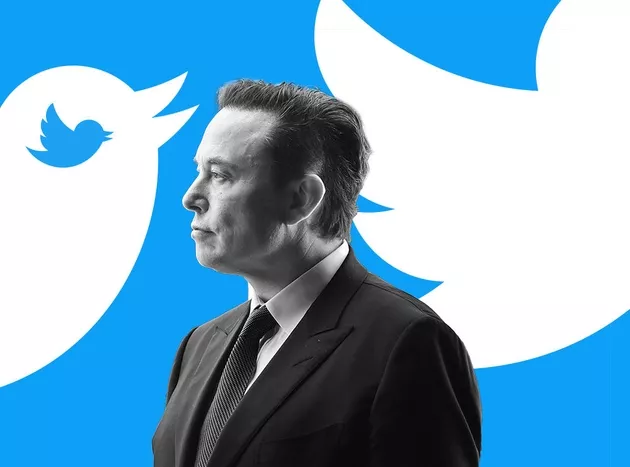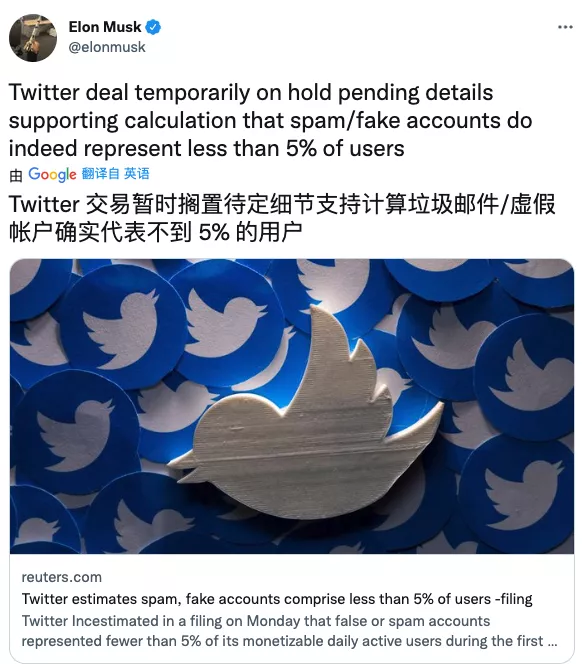On May 16, Beijing time, last Friday, when Elon Musk announced that he would "temporarily suspend" the $44 billion acquisition of twitter, the stock market staged a familiar shock** Once again, he posted a short tweet that stirred the stock market, and his casual treatment of wall street once again raised questions about whether he fully complied with securities regulations.

Musk once posted a notorious tweet in 2018, claiming that he was considering privatizing Tesla and that "funds were in place", leading to the US Securities and Exchange Commission (SEC) suing him. Musk finally reached a settlement with the SEC, paid a fine, and resigned as chairman of Tesla for three years.
Since then, however, the SEC has been relatively restrained, although musk has often provoked and repeatedly tested the limits of the settlement agreement. "The SEC has been careful and musk has taken advantage of it," said David Rosenfeld, an associate professor at the University of Northern Illinois
Nuclear options
However, Musk's recent behavior may eventually expose him to tougher punishment if regulators choose to pursue it. John coffee, a law professor at Columbia University, said he may have put himself within the scope of the SEC's "nuclear option": suspending or completely disqualifying him from serving as a company official or director of a listed company.

This tweet led to a sharp drop in Twitter's share price
Legal experts said that if musk faces legal risks, it is unlikely to come directly from the tweet that led to the decline of Twitter's share price on Friday. In that tweet, musk questioned whether there were more fake accounts on twitter than the company claimed. The tweet caused the market value of Twitter to evaporate $7 billion in pre trading. Two hours later, another tweet from musk said he was still committed to the acquisition made twitter erase half of its losses.
This tweet was widely regarded by Wall Street as a sign that musk was suppressing twitter in order to negotiate a lower price, which eventually led to the closing price of twitter on Friday being 25% lower than the price he agreed to pay.
Legal experts believe that without Musk's false statement or clear evidence that he deliberately pushed down the stock price, it is almost impossible for the SEC to link stock price manipulation with this tweet. Allegations of manipulation are notoriously difficult to prove because they depend on whether intentions can be shown. James Cox, a professor of corporate and securities law at Duke University, said: "the SEC and private litigants are usually not very successful in manipulating allegations. In this case, it may be difficult to prove false statements because musk has repeatedly said that he is worried about the number of robots on twitter."
Two handles
However, securities lawyers said that if musk continues to defy authority and play a marginal ball around the securities law, the SEC has other tools to use to more clearly accuse musk.
One of them is the 2018 settlement agreement, which requires musk to have Tesla's lawyers review any statements that may affect the market in advance. He only needs legal approval on matters affecting Tesla's share price.
However, Henry Hu, a former sec official and now a law professor at the University of Texas, said Musk's tweet on Friday could be caught by the settlement agreement. He added that the tweet could ease Tesla shareholders' concerns that musk would be distracted by owning twitter or that financing the deal might drag down Tesla's share price, but it was unclear whether musk applied to a lawyer to publish the tweet.
Another regulatory threat comes from Musk's disclosure of its investment in twitter. He secretly increased his stake by 9%, exceeding the 5% threshold that triggered the disclosure requirement on March 14. However, musk did not publicly disclose the shareholding until April 4, exceeding the 10 day grace period allowed by federal law.
Musk also listed this shareholding as a passive investment in the initial disclosure document, but one day later, he revised this statement in the second document, saying that he had agreed to join the twitter board of directors. As a result, 10 days later, he went back on his word, gave up his board seat and made a takeover offer for twitter.
Why hasn't the SEC done it yet
The SEC is said to be investigating Musk's delay in disclosure, but some legal experts are still surprised that the SEC has not filed charges. "I'm very surprised that the SEC hasn't filed a lawsuit in the federal court." Cox said. The SEC has yet to comment.
However, a former senior SEC official said the regulator may delay action because it is not only considering the timing, but also looking at whether there is any evidence of possible misrepresentation in the information disclosed by musk. If there is evidence that musk changed Twitter's intentions earlier than shown in the disclosure documents, it will expose him to charges.
However, even if the SEC believes the case needs to be resolved, it is doubtful how hard it will pursue the case. After musk released the privatization tweet of "funds in place", the SEC initially tried to prohibit him from serving as an executive or director of a listed company, but later accepted a lighter settlement.
The former sec official said that the SEC may not ban musk in the end because he has become "an indispensable key figure of Tesla" in order to avoid hitting the company's shareholders. He added that with Apple Unlike business leaders such as Steve Jobs of, Bill Gates of Microsoft or Eric Schmidt of Google, Musk's potential successor remains unclear.
Jay Clayton, then chairman of the SEC, seemed to confirm this when he announced the settlement agreement. "Usually, the interests of ordinary shareholders who are not involved in misconduct are intertwined with the interests of offending executives and the company," he added. "The skills and support of some individuals may be important to the future success of a company.".
Some said concerns about hurting Tesla shareholders continued to weaken the SEC's actions. "I suspect this continues to haunt the SEC to some extent. They are aware of the seriousness of Musk's behavior, but they feel a little tied up in what they can or should do." A former senior SEC official said.
"For such an important company, has he become so important that the SEC dare not do anything?" The former official asked, "this is a question worth studying."
However, Henry Hu said that if the SEC believes that musk has a case to solve, but does not take action, it will attack the core principles of U.S. securities regulation, because full disclosure is crucial to the normal operation of the market. "In general, the core reason for the SEC's existence is in danger." He said. (author / Xiao Yu)